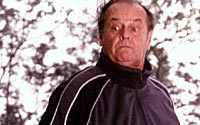
 Rated: R
Rated: R
Stars: Jack Nicholson, Kathy Bates, Hope Davis, Dermot Mulroney, June Squibb, Howard Hesseman, Len Cariou
Director: Alexander Payne
Screenwriters: Alexander Payne, Jim Taylor; based on the novel of the same title by Louis Begley
It is doubtful that anyone under the age of, say, 40, will understand or appreciate this film. It’s all about loss and lack of achievement and is ultimately a sad commentary on getting old. Yet at times, it resonates beautifully with a keen sense of reality, not only from the performances of Jack Nicholson and Hope Davis but because of the manner in which it was shot, including the lighting, set design, cinematography and finally its Midwest setting. Its downside are its pacing and an overreliance on a voice over contrivance as well as on some of Nicholson’s trademark facial expressions.
The novel, on which the film is based, was about a successful New York lawyer who takes a road trip in which he discovers something about himself. Quite a few changes were made overall and the lead character, Warren Schmidt (Jack Nicholson), has been turned into a 66-year-old Omaha, Nebraska, insurance actuary (he calculates people’s life expectancies).
Upon his forced retirement, Warren reassesses his life, wondering whether his job, 42-year long marriage to Helen (June Squibb), and family life with daughter Jeannie were all that he had expected. Jeannie (Hope Davis), is now in her thirties and lives in Denver where she’s soon to marry Randall Hertzel (Dermot Mulroney), an odd-looking dimwit of a waterbed salesman who Warren disapproves of.
When tragedy strikes, Warren takes a cross-country trip in his newly bought Winnebago to perform what he deems an important function, to stop Jeannie’s marriage. Once in Denver, his suspicions of Randall’s inadequacies are confirmed upon meeting Randall’s middle class family: mother Roberta (Kathy Bates), a loose-lipped, foul-mouthed, sex obsessed free spirit who is divorced from a seemingly normal Larry (Howard Hessman). But then there’s the nearly comatose brother Duncan. Warren says he dislikes them all but it’s really his inability to experience the joys of life that are at play here. He seems more frightened of Roberta than turned off.
There’s running commentary in the film in which Warren describes his life story in bitter, pathetic and sometimes very humorous turns in letters to a six-year-old Tanzanian, whom he’s fostered through a television commercial for $22 a month. It’s a nice device but it’s a tad overused, particularly since it adds no further insight into his character.
Over the course of his journey, Warren learns a few lessons about himself: that he took Helen for granted, that you can’t live someone else’s life for them, that America is a special place forged from much hardship and, that in the end, it is possible to make a difference in this world; you just have to pay a little attention. Still, we are left wondering if any of this knowledge will make Warren any happier than when we first met him.
Lotta says: About Schmidt is a well constructed tragicomedy that needed a pace lift. I especially liked Hope Davis whose character and performance seemed the most real. I also liked some of the midwest settings featured in the film and the attention paid to their importance to American life. Nicholson is liveliest in his voice over commentaries but I didn’t think this was his best performance (look to A Few Good Men or As Good as it Gets for that). The scene in which he performs a handsfree urination (back to camera) is right out of Sexy Beast where at least, there, it better fit the character. And somehow, after a while, Nicholson’s smirks, sneers and double-takes tended to betray his portrayal of Schmidt as the “small man” that he says director Alexander Payne asked him to play.
Also featured is Len Cariou as best friend Ray Nichols. It’s rated R for some language and brief nudity.
Reviewed: 1/10/03
